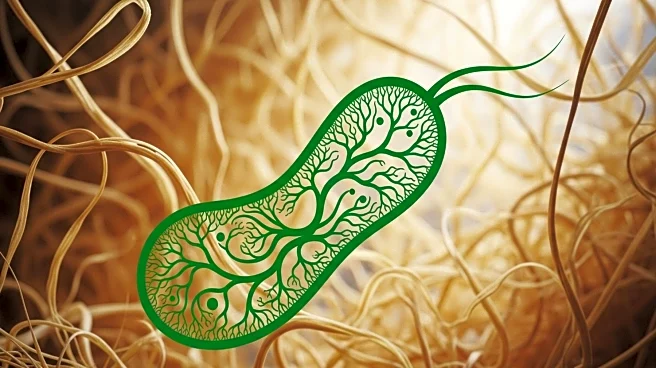What's Happening?
A study from Northwestern University reveals that the bacterium Pseudomonas putida can reorganize its metabolism to efficiently digest lignin, a complex carbon found in plant material. This metabolic shift allows the bacterium to produce six times more ATP, a molecule essential for energy, compared to when it consumes simpler compounds. The bacterium achieves this by rerouting carbon through alternative metabolic pathways, avoiding bottlenecks and enhancing energy production. This discovery provides a quantitative blueprint of how bacteria manage carbon metabolism and energy production during lignin digestion, potentially aiding the biomanufacturing industry in developing microbial factories to convert lignin into biofuels and plastics.
Why It's Important?
The ability of Pseudomonas putida to break down lignin and produce valuable chemicals could revolutionize the biomanufacturing industry. Lignin is an abundant and renewable source of carbon, offering a sustainable alternative to petroleum-based products. Understanding the bacterium's metabolic processes can lead to more efficient microbial factories, reducing reliance on fossil fuels and promoting environmental sustainability. This advancement could benefit industries focused on biofuels, plastics, and other chemical productions, providing a pathway to greener manufacturing practices.
What's Next?
Researchers may focus on optimizing the metabolic pathways of Pseudomonas putida to enhance its efficiency in lignin digestion. This could involve genetic engineering to balance energy production and consumption, ensuring the bacterium remains stable while maximizing output. The biomanufacturing industry might explore commercial applications of this bacterium, potentially leading to new products and processes that utilize plant waste as a raw material.
Beyond the Headlines
The study highlights the delicate balance required in microbial metabolism, where overexpression of certain enzymes can disrupt energy equilibrium. This insight is crucial for biotechnology applications, where metabolic engineering is common. Understanding these natural energy rules can prevent negative impacts on bacterial function, ensuring sustainable and efficient production of bio-based products.










